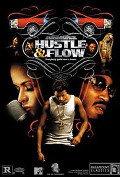
Directed by
Craig Brewer
114 minutes
Rated M
Reviewed by
Sharon Hurst

Hustle & Flow
Synopsis: Memphis street hustler and pimp, DJay (Terrence Howard), runs girls for a living, namely Nola (Taryn Manning), his white “snow bunny”, Shug (Taraji P. Henson), currently out of action because she’s pregnant, and Lexus (Paula Jai Parker) who is also a stripper. Despite his harsh street life DJay has a dream of bettering himself. Having a gift for words, he wants to get his philosophy of life (his “flow”) out there in the form of rap music. When he meets old friend and sound engineer Key (Anthony Anderson) and church musician Shelby (DJ Qualls) they set up a makeshift recording studio and start to make things happen.We know this is a pimp with a difference when in the opening scene DJay expounds to Nola upon the nature of man, and what makes a person’s life worthwhile. Howard is immensely charismatic in his portrayal of DJay, and despite finding the pimp’s life sleazy, we can easily feel for the man and what happens to him. Certainly Howard’s Oscar nomination was well-founded. Similarly the girls around him are easy to engage with, especially Nola, a mixture of street toughness and vulnerability, slut and sweet young thing. Manning simply radiates from the screen, and is so much more complex than the “prostitute with the heart of gold” stereotype we see too often in movies. The soft centre of both Nola and DJay is exemplified in one arresting scene early on when they sit together in a church listening to a beautiful operatic singer, and with no words their faces reflect all the sorrows and hopes of their tawdry lives.
In contrast to the recent, disappointing Get Rich or Die Tryin', this film has much more of an earthy and sincere quality. Whereas the former took the classic rags to riches story line, this looks more at the underlying commonality of all people – that desire to do something in life that matters; getting a sense of being someone by expressing one’s creativity.
The focus upon self-expression is a strong theme throughout and reflected in many of the character’s aspirations. Key has drifted into a middle-class life with conservative wife Yevette (Elise Neal) and longs to re-connect with his roots through music. Shelby, white and working a dead-end job, also craves an outlet, while Shug delivers a heart-rending speech of gratitude to DJay for allowing her to feel special by getting her to sing on a track. The scene in which these three and DJay lay down their first track, “Whoop That Trick” is electric and has a raw energy lacking from other more glib and glossy films dealing with similar subject matter.
Rap music has never been my bag, but the Oscar-winning number "It’s Hard Out There For A Pimp" has gone incessantly round my brain, as it seems to capture something of the film’s essence. Not the least of its essence is director Brewer’s home town of Memphis, iconic symbol of so much ground-breaking music and used to good effect in the film’s look. The run-down neighborhood, the cars, the strip clubs all feature as a counterpoint to Everyman’s Great American Dream. The style of rap featured and known as Crunk, is the signature rap of Memphis. The downside of The Dream is brought out through the contrasting character of Skinny Black (played by rapper Ludacris), who started out authentic, but who has been led astray by ego and fame, and who will prove pivotal in DJay’s journey.
One of the difficulties the film presents is in following the street-jive style of speech, another is the rather denigrating picture of women it portrays. However there are many surprisingly moving and exhilarating moments, along with great performances that make this well worth a look.

Want more about this film?


Want something different?




